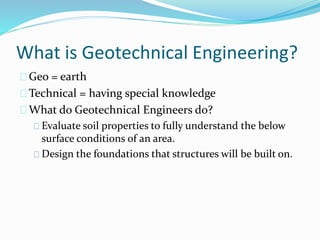An Unbiased View of Geotheta
An Unbiased View of Geotheta
Blog Article
Geotheta Things To Know Before You Get This
Table of ContentsOur Geotheta StatementsGeotheta Fundamentals Explained3 Easy Facts About Geotheta Shown10 Simple Techniques For GeothetaSome Known Details About Geotheta

They conduct site examinations, collect samples, do laboratory examinations, and analyze data to review the viability of the ground for construction tasks - Tailings Engineer. Based upon their findings, geotechnical engineers offer referrals for structure style, incline stability, keeping structures, and reduction of geotechnical dangers. They collaborate with other professionals, such as designers, structural designers, and construction teams, to make certain that geotechnical considerations are integrated into the general task layout and execution
By examining the habits and residential or commercial properties of soil and rock, they can recognize prospective geotechnical threats such as landslides, soil settlement, or incline instability. Their know-how aids prevent failings or accidents that can endanger lives and property. Below are some thorough responsibilities and obligations of a geotechnical engineer: Website Examination: Geotechnical designers conduct site examinations to gather information on subsurface problems.
They interpret the information to understand the homes and habits of the soil and rock, including their toughness, permeability, compaction features, and groundwater problems. Geotechnical Evaluation and Layout: Geotechnical designers analyze the information gathered throughout site investigations to evaluate the security and viability of the website for building jobs. They do geotechnical estimations and modeling to review elements such as bearing capability, negotiation, incline security, lateral planet stress, and groundwater flow.
Excitement About Geotheta
Structure Style: Geotechnical engineers play an essential role in designing structures that can safely sustain the designated structure. They analyze the soil conditions and lots requirements to establish the proper foundation type, such as superficial foundations (e.g., footings), deep foundations (e.g (https://geotheta.edublogs.org/2024/08/02/unlocking-the-world-of-geotechnical-engineers-with-geotheta/)., stacks), or specialized strategies like dirt enhancement. They think about variables such as settlement limitations, birthing capability, and soil-structure communication to establish ideal structure styles
They assess building strategies, display website activities, and perform field assessments to confirm that the layout referrals are followed. If unanticipated geotechnical problems arise, they evaluate the situation and offer recommendations for remediation or changes to the style. Danger Analysis and Reduction: Geotechnical designers examine geotechnical hazards and risks associated with the project site, such as landslides, liquefaction, or soil disintegration.

Partnership and Communication: Geotechnical designers function closely with other specialists entailed in a project, such as designers, structural engineers, and building teams. Efficient interaction and cooperation are crucial to integrate geotechnical factors to consider into the general project design and construction process. Geotechnical designers supply technological experience, solution questions, and make certain that geotechnical needs are met.
Some Known Factual Statements About Geotheta
Right here are some kinds of geotechnical engineers: Structure Engineer: Foundation engineers focus on developing and evaluating structures for frameworks. They assess the soil conditions, load demands, and site characteristics to figure out the most ideal foundation kind and style, such as shallow structures, deep structures, or specialized techniques like pile structures.
They evaluate the variables influencing slope security, such as dirt residential properties, groundwater conditions, and slope geometry, and establish techniques to avoid slope failures and alleviate risks. Earthquake Designer: Quake engineers specialize in assessing and creating frameworks to stand up to seismic forces. They analyze the seismic threat of a site, examine soil liquefaction capacity, and create seismic layout criteria to make certain the safety and durability of structures throughout earthquakes.
They do field screening, gather samples, and analyze the gathered data to identify the dirt residential or commercial properties, geologic formations, and groundwater problems at a site. Geotechnical Instrumentation Engineer: Geotechnical instrumentation engineers concentrate on tracking and determining the actions of dirt, rock, and frameworks. They install and maintain instrumentation systems that keep an eye on elements such as dirt negotiation, groundwater levels, slope motions, and architectural displacements to assess efficiency and give very early cautions of possible concerns.
The Of Geotheta
They perform tests such as triaxial examinations, combination examinations, direct shear tests, and permeability examinations to gather information for check this site out geotechnical analysis and style. Geosynthetics Designer: Geosynthetics engineers concentrate on the design and application of geosynthetic materials, such as geotextiles, geogrids, and geomembranes. They use these products to improve soil stability, reinforce inclines, supply water drainage options, and control erosion.
They have a tendency to be investigative individuals, which indicates they're intellectual, introspective, and analytical. They are interested, methodical, logical, analytical, and rational. Some of them are additionally social, implying they're kind, generous, cooperative, client, caring, handy, compassionate, sensible, and pleasant - Geotechnical Engineers.
In the office setting, geotechnical engineers utilize specialized software application tools to execute estimations, create designs, and assess data. They prepare reports, review job specifications, interact with customers and employee, and coordinate job tasks. The workplace setup offers a conducive setting for study, analysis, and partnership with other specialists associated with the project.
The Of Geotheta
They frequently visit project websites to carry out website investigations, assess geotechnical problems, and collect information for analysis. These gos to entail traveling to different locations, in some cases in remote or difficult surfaces. Geotechnical engineers may execute dirt tasting, conduct tests, and monitor building and construction tasks to make certain that the geotechnical elements of the project are being implemented correctly.
Geotechnical engineers additionally function in specialized geotechnical research laboratories. In these centers, they perform experiments, do tests on dirt and rock samples, and evaluate the engineering homes of the materials. Geotechnical laboratory engineers function thoroughly in these settings, taking care of testing devices, operating tools, and recording data. They work together with other research laboratory personnel to make sure exact and trusted testing outcomes.
Report this page